We welcome first generation farmer Alex Heffron to the Indie Farmer fold. In his debut post Alex and his partner Sam are busy unpacking, planting and taking delivery of livestock as they settle into their new life at Mountain Hall Farm..
It’s taken time for it all to sink in and for us to realise that we’re actually on our own farm. It didn’t feel real during the first few days because since moving in we haven’t really stopped. We’ve either been unpacking and tidying the house, tending to our nine beef cattle, taking care of our two delightful, but attention-demanding rescue collies, gardening, picking up various items from the local farm shop, calling all the relevant authorities and utilities, as well as all the other normal day-to-day things. That’s meant 12-14 hours of solid work each day, but we feel energised by it, not tired, even if our muscles are aching a little.
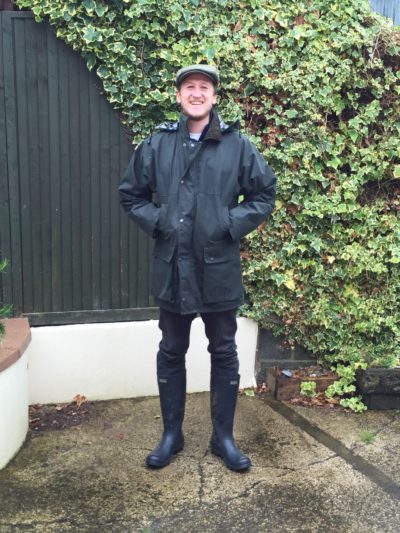
We’ve thrown ourselves right into it, largely out of our own impatience no doubt, but also because we’ve got about 13.5 acres of fertile grazing land to manage, so we actually had our nine lowline dexter crosses moved onto the land about a month before we moved in. But to be fair they take very little work, just checking on their water, going to visit to say hello so they can get used to us and ensuring they have access to minerals. Other than that they look after themselves, ripping and chewing away on the ample grass and clover (don’t mention the docks). Our plan is to use Holistic Planned Grazing and mob graze them, which we aim to set up next month, but for now we are set stocking them. Next week we’ll be ordering the electric fencing required for the mob grazing, and putting together our grazing plan for the rest of the Summer and Autumn. But more on that then.
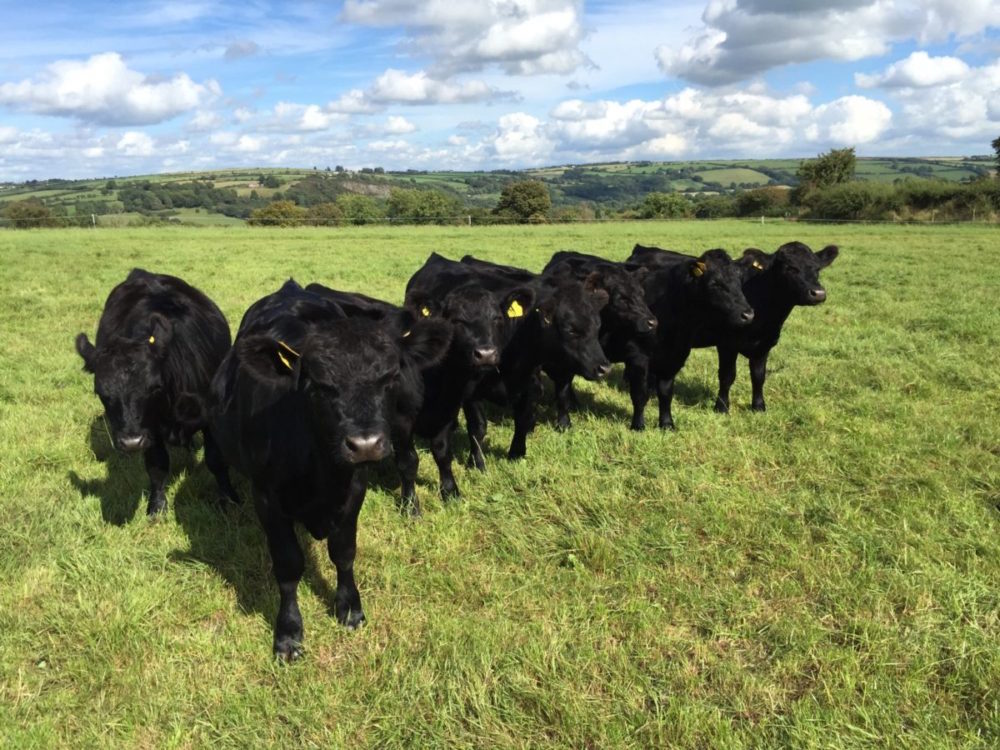
We also picked up two rescue collies from a local dog sanctuary the day after moving in. One boy, one girl, he’s 18 months, she’s 3 years old. They’re a lot of fun, and they also need a lot of attention and time from us. They both have a history of neglect and have a few issues we are having to work through with them, but on the whole they’ve been excellent the last week. Except for one day where they seemed like the best of enemies, snarling, growling, and occasionally snapping at each other. But we have to be patient, and slowly with the right training and care they will get there.
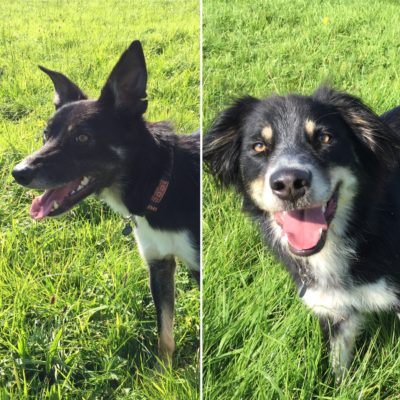
We’ve planted up the rest of the polytunnel but we have been extremely fortunate in that the previous owners, who have been excellent to us, left a large crop of lettuce, onions and a few potatoes, along with a huge patch of raspberries. In our first week we had 4 onions, about a dozen potatoes, 3 lettuces and about 2 kilos of raspberries! All we had to do was harvest them! Sam made our first batch, of what will no doubt be many batches, of raspberry jam which tasted fantastic on our buckwheat pancakes! It’s going to be a job finding different ways of eating and preserving the raspberries, as we’ve been told they will crop steadily until October/November, not that we’re complaining – it’s a nice problem to have!
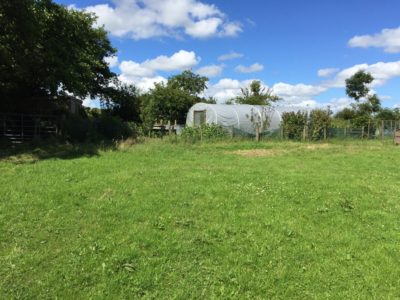
In the polytunnel we have planted cucumber, courgette, aubergine, butternut squash, little gem, wild rocket, peppers and tomatoes. The previous owners also left us five strong, healthy tomato plants, which have started to bear green fruits, hopefully to ripen sometime in the next few weeks. Outside we turned over what was a veg bed, but had become swamped with weeds and grass. We hand-weeded it, used a pitchfork like a broadfork to break the soil up and aerate it slightly, turned it over, mixed in composted horse manure (of which we have plenty of, again thanks to the previous owners, along with a large pile of composted cow manure), watered it, and planted it up with baby corn, cavolo nero, cauliflower, beetroot and rainbow chard. Fingers crossed the slugs leave them alone!
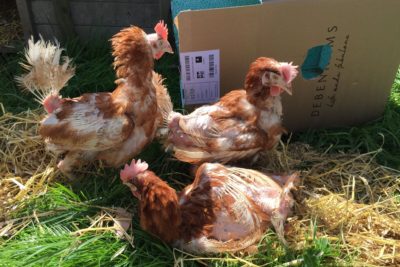
We also picked up 4 ex-caged chickens, organised by the British Hen Welfare Trust. They’re in a sorry state as you can see, but in a month or two they’ll start to look and act like chickens. If we hadn’t taken them they’d be off to slaughter – for chicken soup or dog food most likely, but they’ve still got some good laying years in them, and with a bit of TLC can live some happy years ahead. It’s quite confronting to see just how bad the chickens look after just 12 months in an intensive caged system. If people realised just how bad they are would they continue to buy caged eggs? I think many wouldn’t. And these are from what they call ‘enriched cages’ too. Whatever the hell that means in practice.
What else? My copy of Richard Perkins’ (Ridgedale Permaculture), excellent, highly recommended book, Making Small Farms Work, arrived in the post. What a resource that book will be. What I love is that it’s very practical as I’ve read enough books on theory, it’s the practical guidance I need, and that book provides it in spades. It has everything from taking you step-by-step though a Permaculture and Keyline design based design and planning process, to building your holistic goal and context and explaining how Holistic Management works (in a far more succinct and effective way than Allan Savoury’s books do), how to build an egg-mobile, how to build a chicken slaughter facility that meets EU regs, there’s spreadsheets galore on the business side of things, how to establish a no dig market garden, how to do fencing, an in-depth guide to silvopasture, and much more. Can’t recommend it enough. It’s been the perfect companion for the odd free moments I’ve been able to grab.
Walking around we’re making notes on what we see, and penning lots of observations, notes and ideas. The biggest problem is that there’s lots we want to do, and not enough hours in the day! But then that’s a self-inflicted pressure, and we have to be careful not to over-burden ourselves or it will quickly become overwhelming.
Other than that, it’s just been surreal to walk around the fields and realise that they’re ours. That this land, the green, green grass, the rich soil, the trees are all ours to look after and steward. The fortune bestowed on us to be in this position is not lost on us. We realise that we’re currently in the honeymoon period, and that there will be tougher times ahead but for now we’re going to enjoy our honeymoon.



